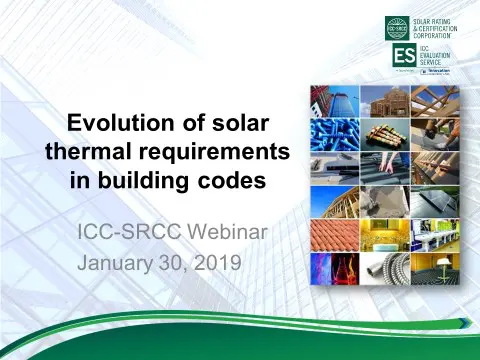The contents of this Section, including all opinions and other postings, are offered for informational purposes only and should not be construed as legal or tax advice. You should consult directly with an attorney or accountant for individual advice regarding your particular situation.
This webinar was originally presented in October, 2024 and provided an overview of new regulations affecting solar pool heaters in the 2025 California Energy Code. The new code will go into effect on January 1, 2026. It also summarized other regulations like FDAS for pool pump controls, DOE dedicated pool pump standards and potential future zero-emission water heater rules from CARB.
Navigating the 2025 California Energy Code: Solar Pool Heater Requirements
The U.S. Federal government has provided tax credits for qualifying renewable and energy efficient products installed in U.S. residences since 2006 (§ 25D of the Internal Revenue Code). This was amended with the passage of the Inflation Reduction Act of 2022 (IRA), Public Law 117-169, 136 Stat. 1818, and is now known as the "residential clean energy property credit."
To qualify for the residential clean energy property tax credit, the IRA legislation states that the solar water heaters installed homes must be certified (see IRS Form 5695):
"To qualify for the credit, the property must be certified for performance by the nonprofit Solar Rating Certification Corporation or a comparable entity endorsed by the government of the state in which the property is installed."
U.S. Code 26 § 25D(b)(2)
Other conditions and requirements apply as set by the law and the IRS. Consult a qualified tax professional and additional resources including the following:
- Frequently asked questions about Energy Efficient Home Improvements & Residential Clean Energy Property Credits (IRS FS-2024-15)
- Inflation Reduction Act of 2022 (IRS)
- Form 5695 (IRS)
- Form 5695 Instructions (IRS)
- IRA-Related Tax Guidance (US Department of the Treasury)
- Taxpayer IRA Resource Hub (US Department of the Treasury)
- Residential Renewable Energy Tax Credit (DSIRE)
- Homeowner's Guide to 2025 Federal Solar Tax Credit (Solar Reviews)
This webinar describes the significant changes in the latest, 2020 editions of the ICC/SRCC solar thermal standards. It address changes to requirements for solar thermal collectors in ICC 901/SRCC 100 and for solar thermal systems in ICC 900/SRCC 300. It also describes the process for rolling out the standards in the OG-100 and OG-300 certification programs.
Natural Resources Canada has developed and maintains energy simulation tools for low-rise residential buildings. The software was designed to support the EnerGuide Rating System, ENERGY STAR® for New Homes and R-2000 energy efficiency programs. NRCan also supported the addition of Canadian One-Day Ratings to most ICC-SRCC OG-300 system certifications. This value, which is based on the conditions established in the CAN/CSA F379 Series-09 (R2013) - Packaged solar domestic hot water systems standard.
DSIRE is the a comprehensive online source of information on incentives and policies that support renewable energy and energy efficiency in the United States. Established in 1995, DSIRE is operated by the N.C. Clean Energy Technology Center at N.C. State University and is funded by the U.S. Department of Energy. DSIRE contains information on many regulations and incentive programs for solar heating and cooling technologies, most of which reference SRCC OG-100 and/or OG-300 certification. The easy-to-use website allows users to seek out programs applicable to their U.S. state and technology and application of interest. Click here to learn more about DSIRE.

This webinar was originally presented in January, 2019, and provides an overview of the codes that impact the solar heating thermal industry across the U.S. It identifies the relevant model codes and where they are adopted. It also notes states where local and amended codes are being used, creating localized requirements. The webinar describes ways key solar industry standards like SRCC Standard 100, 300 and 400 are referenced in the codes. It also shows how many other non-solar standards like NSF 61, NSF 372, UL 1703 and ASCE 7 can apply to solar heating and cooling systems. It ends by showing how certifications and listings are used to show compliance with code requirements.


